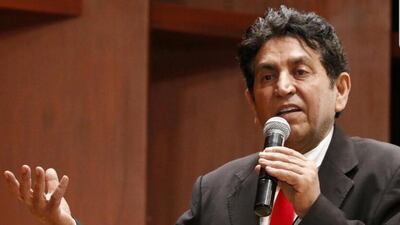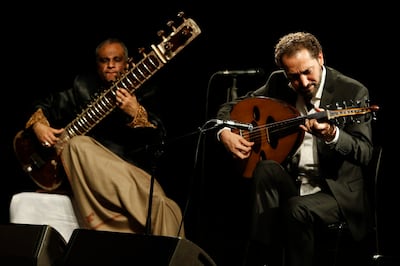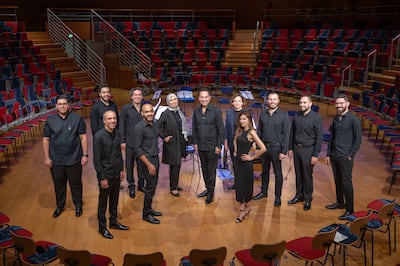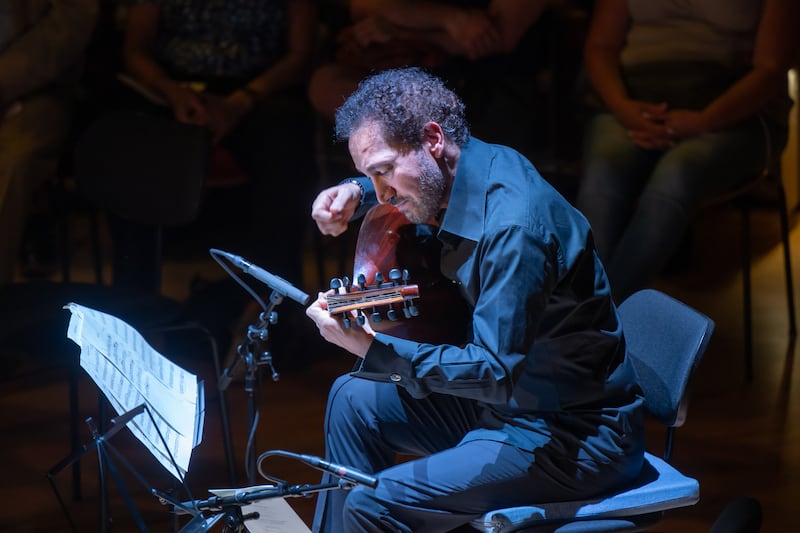“In the name of peace, I love Baghdad.”
These are the opening words of Iraqi oud composer Naseer Shamma’s Sunday show in the German capital of Berlin, where he concluded the Arabic Music Days concert series at the Pierre Boulez Saal.
Organised by the Abu Dhabi Festival, the five-day event featured nightly gigs headlined by graduates of Bait Al Oud Cairo and its other locations, a music conservatory founded by Shamma and dedicated to the historic stringed instrument.
Launched in Cairo in 1999, it has grown to include international branches in Baghdad and Abu Dhabi as well.
While Shamma’s concert had him team up with former students for a heartfelt concert, the pride was undercut by the gnawing sadness of a departed friend.
On September 1, Iraq lost one of its greatest modern poets with the death of Karim Al Iraqi.
Known for his songwriting collaborations with fellow national and singer Kadim Al Sahir, Al Iraqi died from prostate cancer aged 68 in an Abu Dhabi hospital before his body was repatriated in Baghdad for a funeral.

Speaking to The National backstage in Berlin, Shamma explained he was still devastated by the loss.
“He was someone that I would try to call every week no matter where in the world I was. I valued his spirit, generosity and curiosity,” he says.
“We were planning on working on a celebration of his poetry with a concert at Bait Al Oud in Abu Dhabi once he got better.
“I am sad that he won’t be there to see and feel the appreciation people have for all that he has done.”
True to his word, Shamma confirms the event will go ahead in Abu Dhabi after the 40-day mourning period ends on October 11 with an announcement coming soon.
Part of the system
It also marks the latest of many responsibilities Shamma juggles, which also includes opening new Bait Al Oud branches in Riyadh this year and Sulaymaniyah in Iraq in 2024.
This is on top of an exhaustive performance schedule that includes a recently completed US tour with jazz trumpeter Wynton Marsalis.
However, more than the sold-out shows and expanding the oud’s appeal to an international audience, Shamma considers Bait Al Oud as his greatest life work.
He points to the acclaimed careers of graduates such as Swiss Egyptian artist Nehad El Sayed and Egyptian film composer Mohamed Abozekry, both of whom performed in Arabic Music Days, as providing him with a satisfaction more fulfilling than solo career accolades.
“When I meet my students and see their own growth as artists it does give me a sense that I am choosing the right path in life,” he says.
“And a lot of this is really in reaction to the way I was first taught music in the conservatories in Baghdad where the education was general and the teachers were stingy in sharing their own personal insights.
“It felt to me that by sharing that knowledge my teachers would feel they were having something stolen from them. It got to such an extent where they wouldn’t even share the brand names of their oud strings.”

Born in the eastern Iraqi city of Kut in 1963, Shamma began taking oud classes from the age of 12 before formally studying the instrument at the Baghdad Academy of Music.
Shamma graduated from the six-year course in 1987, but still recalls being chafed by the rigidity of the teachings.
"I remember finishing the course work and studies by the second year of the course.
“The teachers told me there was nothing I could do but stay in the university for four more years even if I already learnt everything I could.
“So I had to stay and became a teacher as well as a student," he recalls.
"I remembered how inflexible it all was. Everything followed certain rules set by the education authorities and discussions to change any policy were not entertained."
A new way of teaching
These frustrations pushed Shamma to launch Bait Al Oud in Cairo, a private academy offering courses on the oud and associated instruments such as the qanun and the saz, also known as the baglama.
With students taking an average of three classes per week, the school defines itself with an educational approach that was as focused as it was tailor made.
Instead of a set finish date, students can graduate earlier from the average two- to three-year course if deemed ready to sit in the final performance exam.
In the case of Abozekry, the Egyptian’s education was enriched further when Shamma invited him on a regional tour with his band as a teenager.
“I was only 14 years old when I was in Bait Al Oud Cairo and Mr Naseer thought I was ready to join him and the band on the road,” he tells The National.
“At that age I was very inquisitive and really loved the instrument and just being in that environment. I think he saw a bit of himself in me and we went on this tour and played shows in Egypt and Morocco.
“He showed me that the life of a musician is also about what happens on the stage, in how you carry yourself in public and how you interact with your band. It was priceless and I still learn from that experience today.”
Shamma says he is not interested in unearthing the big oud artist in his own mould.
“Everybody needs to express themselves in their own way and all I am doing is helping them find that path,” he says.
“And then I hope that they pass on those teachings to the next generation once I am gone.”

Shamma admits the death of Al Iraqi has stirred some thoughts about his own legacy.
More than the immense musical contributions, Shamma says he would like to be remembered as someone who made the oud accessible to listen and learn.
“Bait Al Oud is meant to outlast me because what I leave behind is a system of teaching,” he says.
“Every student or teacher that comes from school will carry what I learnt and experienced to share with people for hundreds of years to come.”
It is a viewpoint partly inspired by one of his last conversations with Al Iraqi.
“He told me the cancer has spread and we knew the end was coming soon,” Shamma says.
“But even in those moments, he was strong in mind, optimistic and spoke about how we should aspire to do things that leave an impact.”







